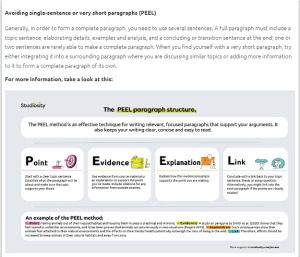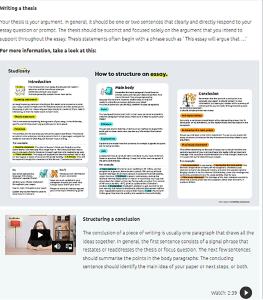Studiosity is a paid for, free at point of use service, offered to PGT students at the University of Lincoln. Its Writing Feedback service offers ethical academic writing and referencing feedback on draft writing (not a review of content) from a real person in less than 24 hours (up to 8,000 words per interaction), and its Connect Live service offers one-to-one personal help in real time for all the core skills university students need.
Individual PGT students can get 10 interactions with Studiosity support in one academic year which can include advice about academic writing, focussed comments on writing structure, choice of language, spelling/grammar and use of sources.
Examples of what this support looks like for students are below:


February 2023 MA starters were required to complete a formative assessment (approx. 1,500 words) for their first core module Critical Engagement with Educational Literature. This assessment comes halfway through the module and feedback is given by Personal Tutors regarding the student’s area of interest in educational studies. Tutors have previously informally stated that much of the feedback given is concerned with students’ academic writing skills, how to cite literature in the main body of the assignment, as well as create a reference list. This is despite writing skills already having been a key focus within the module’s seminars, and students receiving input from both the International College and Academic Librarian. As a result, this assessment point seemed the most obvious place to introduce Studiosity into our programme. Most of our MA students are international students who have experienced different education systems and therefore come with different expectations. Using Studiosity as a standard support mechanism enabled us to assist them with the provision of high-quality feedback on their academic writing skills.
Introducing Studiosity – all members of School staff were introduced to Studiosity support via email, and specifically in relation to this module’s formative feedback process. Staff were provided with an informative PowerPoint presentation which was then shared with students in a seminar to facilitate their introduction to and understanding of how it worked. References to Studiosity continued to be made in seminars, particularly as the submission date for the formative assessment approached. Students were also advised to ensure that they gave themselves enough time to redraft their work, should they need to do so, based on the feedback they would receive from Studiosity.
Student engagement – we know that 60% of the cohort subsequently submitted a written piece of work into Studiosity. Personal Tutors were made aware of those students who had accessed the service and provided with a selection of anonymised feedback examples for each aspect that Studiosity reviews.
Student feedback – MA students were surveyed regarding their experiences of using Studiosity. All respondents indicated that it was easy to log into and create an account, with 94% using the writing feedback service stating ease in uploading their work. All but one student received their feedback in six hours or less, and most received feedback on all focus areas (structure, choices of language, argument/idea development, spelling/grammar, and use of sources). Feedback on use of sources was ranked as the most helpful – ‘Studiosity was helpful during my formative assessment because it gave me the opportunity to correct both grammatical and structural errors before finally submitting to my personal tutor for review.’
Staff feedback captured reflects ‘I had a group tutorial and the work I looked at was better than expected, except for the one student who had not used Studiosity. She sent a revised draft earlier this week and it is much improved. Feedback from students is good, too.’
Data from summative assignments for this cohort show that in the Style assessment grade:
- 79% of students accessing Studiosity achieved a pass grade or above
- 32% of these students achieved a merit or distinction
- 63% of students not accessing Studiosity achieved a pass grade or above
- Only 7% of these students achieved a merit or distinction
Future plans – based on positive feedback from both students and staff we are looking to embed Studiosity in all our MA modules in the new academic year. Students will be signposted to service in both Programme and Module handbooks, as well as introduced to the service during early teaching sessions.
The University runs a Studiosity Advisory Group – jointly run by Libraries & Learning Skills and the Dean of International PGT Students.
